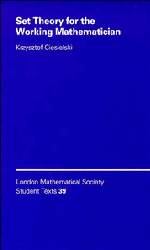8 - Martin's axiom
from Part IV - When induction is too short
Published online by Cambridge University Press: 05 June 2012
Summary
Rasiowa–Sikorski lemma
The previous chapter was devoted to constructing objects by transfinite induction. A typical scheme for such constructions was a diagonalization argument like the following. To find a subset S of a set X concerning a family P = {Pα : α < κ} we chose S = {xξ ∈ X : ξ < κ} by picking each xξ to take care of a set Pξ. But what can we do if the cardinal κ is too big compared to the freedom of choice of the xξs; for example, if the set X has cardinality less than κ?
There is no absolute answer to this question. In some cases you can do nothing. For example, if you try to construct a subset S of ω different from every set from the family P(ω) = {Bξ: ξ < c}, then you are obviously condemned to failure. The inductive construction does not work, since you would have to take care of continuum many conditions, having the freedom to choose only count ably many points for S.
In some other cases you can reduce a family P to the appropriate size. This was done, for example, in Theorem 6.3.7 (on the existence of Bernstein sets) in which we constructed a nonmeasurable subset B of ℝn: The natural family P - ℒ of cardinality 2c was replaced by the family P0 = {Pξ: ξ < c} of all perfect subsets of ℝn.
- Type
- Chapter
- Information
- Set Theory for the Working Mathematician , pp. 129 - 163Publisher: Cambridge University PressPrint publication year: 1997



